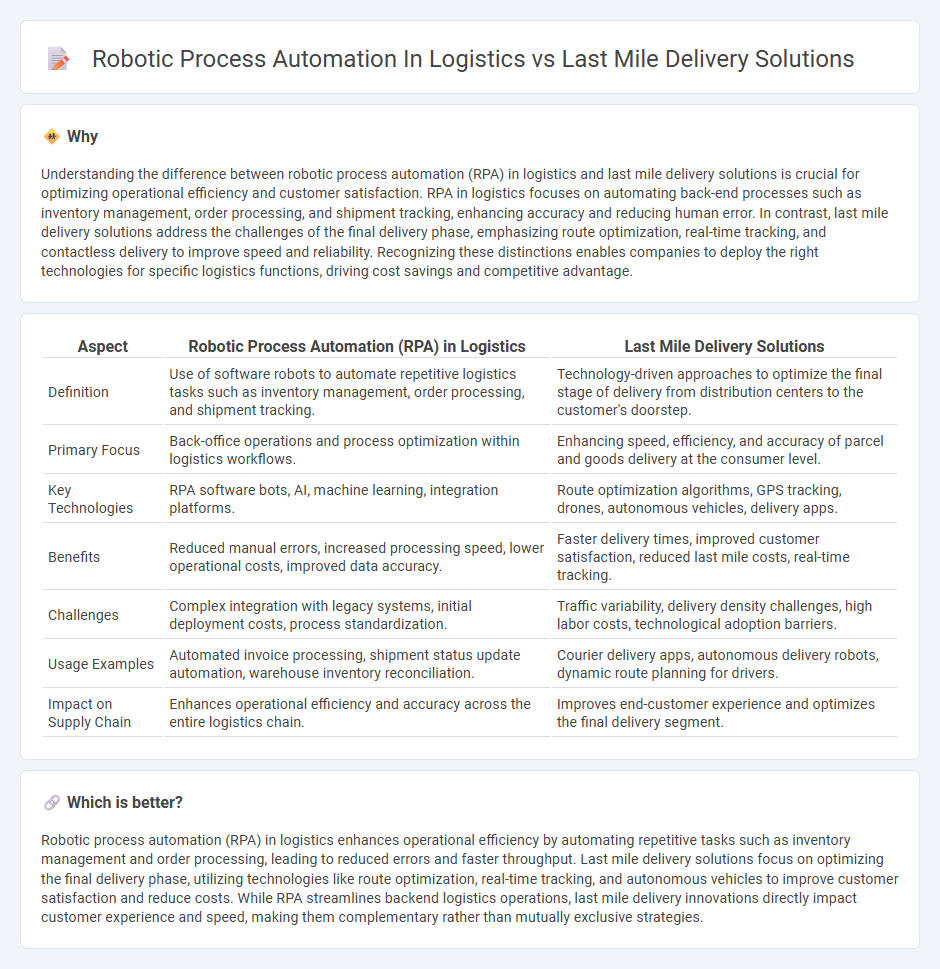
Robotic Process Automation (RPA) in logistics streamlines repetitive tasks such as inventory management, order processing, and shipment tracking, significantly improving operational efficiency and reducing errors. In contrast, last mile delivery solutions focus on optimizing the final step of the delivery process by using route optimization, real-time tracking, and autonomous delivery vehicles to enhance customer satisfaction and reduce delivery times. Explore how integrating RPA with advanced last mile delivery technologies can revolutionize your logistics operations.
Why it is important
Understanding the difference between robotic process automation (RPA) in logistics and last mile delivery solutions is crucial for optimizing operational efficiency and customer satisfaction. RPA in logistics focuses on automating back-end processes such as inventory management, order processing, and shipment tracking, enhancing accuracy and reducing human error. In contrast, last mile delivery solutions address the challenges of the final delivery phase, emphasizing route optimization, real-time tracking, and contactless delivery to improve speed and reliability. Recognizing these distinctions enables companies to deploy the right technologies for specific logistics functions, driving cost savings and competitive advantage.
Comparison Table
| Aspect | Robotic Process Automation (RPA) in Logistics | Last Mile Delivery Solutions |
|---|---|---|
| Definition | Use of software robots to automate repetitive logistics tasks such as inventory management, order processing, and shipment tracking. | Technology-driven approaches to optimize the final stage of delivery from distribution centers to the customer's doorstep. |
| Primary Focus | Back-office operations and process optimization within logistics workflows. | Enhancing speed, efficiency, and accuracy of parcel and goods delivery at the consumer level. |
| Key Technologies | RPA software bots, AI, machine learning, integration platforms. | Route optimization algorithms, GPS tracking, drones, autonomous vehicles, delivery apps. |
| Benefits | Reduced manual errors, increased processing speed, lower operational costs, improved data accuracy. | Faster delivery times, improved customer satisfaction, reduced last mile costs, real-time tracking. |
| Challenges | Complex integration with legacy systems, initial deployment costs, process standardization. | Traffic variability, delivery density challenges, high labor costs, technological adoption barriers. |
| Usage Examples | Automated invoice processing, shipment status update automation, warehouse inventory reconciliation. | Courier delivery apps, autonomous delivery robots, dynamic route planning for drivers. |
| Impact on Supply Chain | Enhances operational efficiency and accuracy across the entire logistics chain. | Improves end-customer experience and optimizes the final delivery segment. |
Which is better?
Robotic process automation (RPA) in logistics enhances operational efficiency by automating repetitive tasks such as inventory management and order processing, leading to reduced errors and faster throughput. Last mile delivery solutions focus on optimizing the final delivery phase, utilizing technologies like route optimization, real-time tracking, and autonomous vehicles to improve customer satisfaction and reduce costs. While RPA streamlines backend logistics operations, last mile delivery innovations directly impact customer experience and speed, making them complementary rather than mutually exclusive strategies.
Connection
Robotic process automation (RPA) in logistics streamlines repetitive tasks such as inventory management, shipment tracking, and order processing, enhancing efficiency and accuracy. Integration of RPA with last mile delivery solutions optimizes route planning, real-time tracking, and automated customer notifications, reducing delivery times and costs. This connectivity drives improved supply chain visibility and customer satisfaction while minimizing operational errors in the logistics sector.
Key Terms
**Last Mile Delivery Solutions:**
Last mile delivery solutions optimize the final stage of the supply chain by enhancing speed, accuracy, and customer satisfaction through real-time tracking, route optimization, and flexible delivery options. These solutions leverage advanced technologies such as GPS, mobile apps, and smart lockers to reduce delivery times and operational costs while improving parcel security. Discover how last mile delivery solutions can transform your logistics operations and boost competitive advantage.
Route Optimization
Last mile delivery solutions prioritize route optimization to reduce transit time, fuel consumption, and operational costs by leveraging GPS tracking, dynamic routing algorithms, and real-time traffic data. Robotic process automation (RPA) in logistics enhances route optimization through automated data processing and integration, streamlining dispatch operations and improving decision accuracy. Explore the latest innovations in route optimization by combining last mile delivery strategies with robotic process automation to maximize efficiency.
Delivery Tracking
Last mile delivery solutions leverage GPS, IoT sensors, and mobile apps to provide real-time delivery tracking, enhancing transparency and customer satisfaction in logistics operations. Robotic Process Automation (RPA) optimizes backend logistics workflows by automating data entry, order processing, and exception handling, thus indirectly improving the accuracy and speed of delivery tracking updates. Explore how integrating these technologies can revolutionize delivery tracking efficiency and reliability.
Source and External Links
LMS | Nationwide Parcel Delivery - LMS offers a competitive multi-regional last mile delivery service with next-day nationwide coverage, real-time visibility, flat pricing with no surcharges, and customized white-glove solutions.
Best Last-Mile Delivery Technology Solutions Reviews 2025 - Gartner - Top last-mile delivery solutions include AI-powered platforms like FarEye, transport management systems like Tiramizoo, and route planning software by Descartes, all designed to optimize delivery efficiency and visibility.
Last mile delivery: solutions for your business | DHL Discover - Last-mile delivery involves moving goods from a local hub to the final customer, emphasizing speed, cost-efficiency, reliability, and traceability, with options such as van, bike, parcel lockers, and emerging autonomous delivery methods.
 dowidth.com
dowidth.com